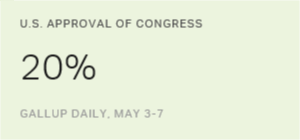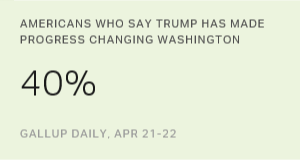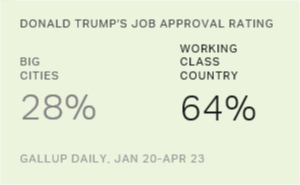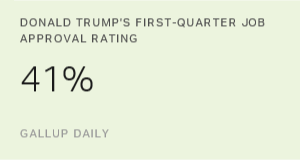Story Highlights
- 20% of Americans approve of Congress, same as April
- 74% disapprove, also unchanged
- Congressional approval among Republicans down 22 points since February
WASHINGTON, D.C. -- One in five U.S. adults (20%) in May approve of the job that Congress is doing, remaining unchanged from last month. Nearly three in four (74%) disapprove.
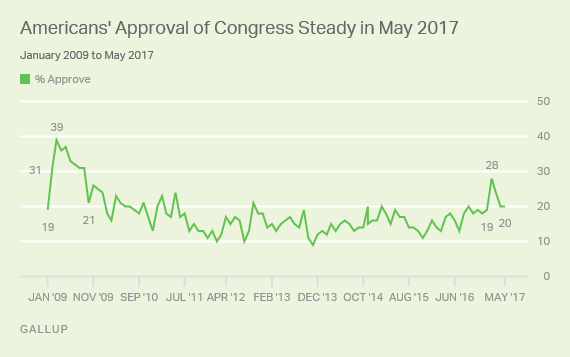
These data come from Gallup's survey of 1,011 U.S. adults conducted from May 3-7. On May 4, during the course of the polling, the U.S. House of Representatives voted to repeal the Affordable Care Act. The survey also occurred within a week of Congress' adoption of a spending package to avert a potential government shutdown.
In the midst of these events, Congress' current approval rating is down from 28% in February. The February spike, measured shortly after President Donald Trump's inauguration, was the highest approval rating for Congress among Americans since 2009 and was up from 19% in January. Approval of Congress remained elevated, at 24%, in March but fell to 20% -- nearly the pre-inauguration level -- in April, where it remains.
Gallup observed a similar pattern after Barack Obama's inauguration in February 2009, with Americans' approval of Congress rising from 19% in January 2009 to 31% the next month. However, unlike this year when Congress' post-inauguration bump lasted only two months, in 2009, the increase lasted eight months. Congressional job approval remained higher than 30% through September 2009, then dropped to roughly a pre-inauguration level of 21%.
Republicans' Approval Down by Nearly Half Since February
Twenty-eight percent of Republicans say they approve of the job Congress has been doing, similar to the 31% who approved in April. However, this is down 22 percentage points from 50% in February, the highest approval rating for Congress among Republicans since November 2006 (50%).
The reasons for this collapse in approval among Republicans may include frustration with Congress' inability to pass much of the legislation that Trump and the GOP favor. The U.S. House of Representatives was initially unable to repeal the Affordable Care Act, and Trump's plans for tax reform, as well as increasing spending on infrastructure, remain stalled.
The poll dates span the House's successful vote to repeal the ACA, meaning it is unclear what effect, if any, that legislative achievement may have had on Republicans' views of Congress.
Among Democrats, approval of Congress has been steady at 10% in April and May. Democrats' approval of Congress has only fluctuated slightly since Trump's inauguration, hovering between 10% and 12% since February.
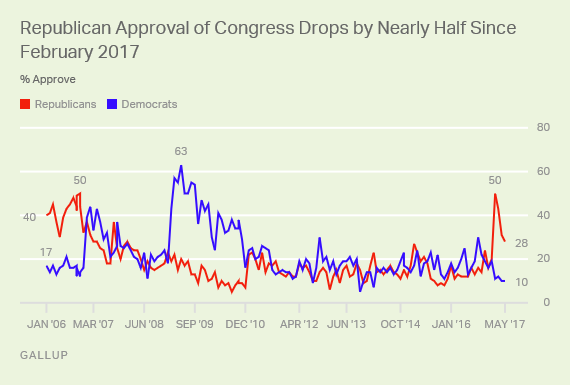
Bottom Line
Republicans had high hopes for the passage of policies they supported after the GOP captured the presidency and Congress in the November elections. Those hopes translated into a spike in approval for Congress among members of the party after Trump's inauguration in January. However, the realities of the difficulties of governing, even when a single party is in control of the legislative and executive branches, appear to have negatively affected Republicans' approval of Congress. The recent House vote to repeal the ACA may yet result in an increase in approval for Congress among Republicans, but no immediate effect was evident in the May survey.
The initial spike in approval among Republicans had driven overall support for Congress up in recent months. However, with Republican optimism waning, Congressional approval among the public as a whole has dwindled back down to the pre-inauguration level.
Historical data are available in Gallup Analytics.
Survey Methods
Results for this Gallup poll are based on telephone interviews conducted May 3-7, 2017, with a random sample of 1,011 adults, aged 18 and older, living in all 50 U.S. states and the District of Columbia. For results based on the total sample of national adults, the margin of sampling error is ±4 percentage points at the 95% confidence level.
Each sample of national adults includes a minimum quota of 70% cellphone respondents and 30% landline respondents, with additional minimum quotas by time zone within region. Landline and cellular telephone numbers are selected using random-digit-dial methods.
View survey methodology, complete question responses and trends.
Learn more about how the Gallup Poll Social Series works.
